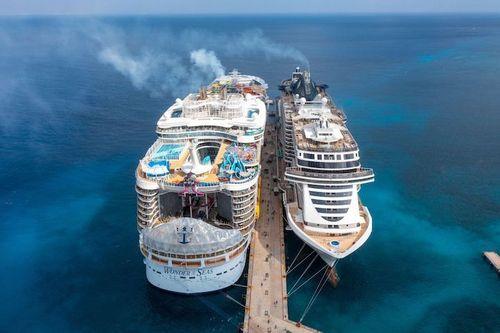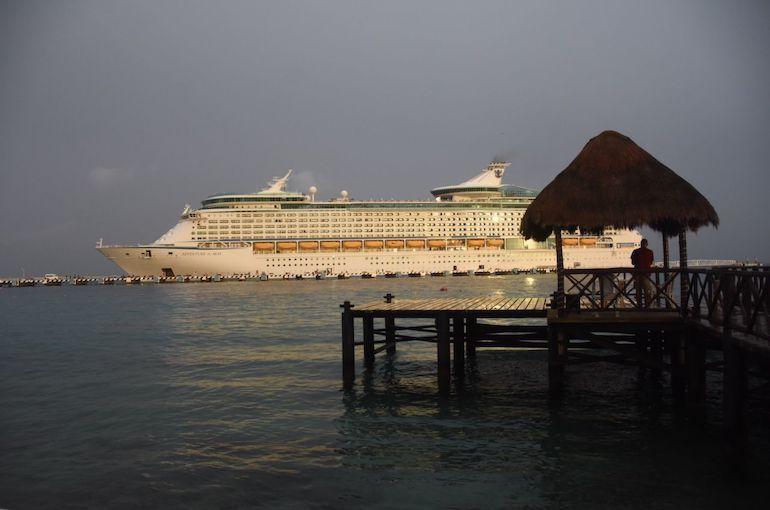The citizen organization to stop mega-cruise projects in La Paz, Baja California Sur, and Cozumel, Quintana Roo, won its first battle.
After a series of demonstrations, legal remedies and the joint campaign #SobornemosSemarnat, there was a suspension of dock construction works in both parts of the country. However, environmental groups remain alert.
“It's not definitive yet. It is a process that we have seen in many places in Mexico, mainly on the subject of mining, where what they do is remove one project, but they return with another, either with a different company name or changing the Environmental Impact Manifestation (MIA),” explained Alekz Águila, spokesman for the Torpedo collective.
In the case of La Paz, it was at the end of March that the Undersecretary of Environment and Natural Resources of Baja California Sur unofficially revealed that Aqua Mayan, the promoting company, had abandoned the Environmental Impact Assessment process. Days later, the federal body (Semarnat) confirmed this.
“But let's remember that the company already has a 25-year concession for the space where it intends to do this project,” Águila explained.
The concession referred to by the environmentalist was granted by the Integral Port Administration of Baja California Sur (APIBCS) to the corporate ITM Group and Carnival to begin an expansion project at the Pichilingue Maritime Terminal.
This news came after the arrival of Oasis-type mega-cruises, those with a capacity of more than 5,000 people, from the end of 2020 to April 2021. All arrived without tourists and justified their presence as a pause due to inactivity.
At the time, researchers who also joined the citizen organization analyzed the project's MIA and found that information related to the environmental impact of the works was missing.
Mainly because of the Balandra Protected Natural Area. An area that is part of the wetlands with international recognition as a Ramsar Site, as well as being home to endangered flora and fauna, such as golden eagles and red, white and black mangroves.
So far, the APIBCS has not responded to the status of the 25-year grant.
“There is a lot of joy, but what we are looking for is that this feeling of victory is only understood as a temporary victory and not as a definitive one,” added the representative of the Torpedo collective.

The Wonder of the Seas cruise ship, known as the largest in the world, arrived at Cozumel Island on March 14. Photo: Cuartoscuro.com
A protection for Cozumel
For Cozumel, the favorite destination for mega-cruises in the world, an amparo temporarily halted the construction of the fourth pier by the company Muelles del Caribe.
On April 11, the Third District Court in Cancun, in charge of Judge Pamela López Swain, granted the Isla Cozumel Citizen Collective the definitive suspension of the concession for the project.
“This means that until the trial related to the amparo is over, whose temporality is not defined because it can last months or years, we have the support that the works related to the cruise ship dock will not be carried out,” explained Rodrigo Huesca, a member of the Citizens' Collective.
Unlike La Paz, where mega-cruises have never arrived, in Cozumel the different governments have focused on promoting this type of mass tourism. Achieving the construction of the Puerta Maya, SSA Mexico and Puerto Langusta piers.
The collective concern to stop the construction of a fourth pier, according to Huesca, emerged after the Covid-19 pandemic.
The lockdown measures showed that, with activity or inactivity, cruise ships did not represent an economic spill for the local population. Because, by including travel, lodging, food and entertainment, tourists' investment is usually left inside ships.
In addition, environmental groups also assessed that the MIA reviewed by Semarnat did not include concise information on environmental impact, mainly in relation to the presence of corals in the region.
“It's very hasty and optimistic to think that the situation has already been won. We're not saying that it won't be built, we're saying that until the trial is resolved, they can't move a single coral,” Huesca added.
The environmentalist also recalled that although the granting of the concession title was published in the Official Gazette of the Federation on January 5, there are still no permits for the work at the municipal level.
With no definite dates, the trial continues in Cozumel and the suspension is not definitive in La Paz, but locals agree that mega-cruise tourism will no longer be welcome.



Comentarios (0)